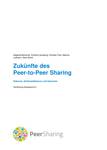Futures of Peer-to-Peer Sharing. Discourses, key factors and scenarios
Abstract
In this working paper, scenarios are developed that illustrate possible development paths and provide guidance on how the potential of peer-to-peer sharing can be tapped for sustainable economic activity. In a trend scenario, a possible course of development is shown that is based on reliable trends. In a transformation scenario, the potential of peer-to-peer sharing is placed in the context of socio-ecological change. The trend scenario makes it clear that peer-to-peer sharing with its platforms is not a temporary phenomenon. After the founding phase and a subsequent phase of rapid growth and expansion, the market for peer-to-peer sharing is in a phase of consolidation, differentiation and upheaval, characterised by abandonment, mergers, new business and revenue models, and cooperations. The market is developing extremely dynamically, but also very heterogeneously in different consumption fields. The challenge in diffusion is to shape the process of transition from the niche to the social mainstream in such a way that the resource efficiency potentials inherent in more intensive product use are tapped as fully as possible, without this being done at the expense of other public welfare interests. This is the focus of the transformation scenario. In addition to the sustainable design of the business models of the digital intermediary platforms and the creation of suitable political and legal framework conditions, it is important that commercial peer-to-peer sharing is generally embedded in sustainable consumption; only then can possible sustainability potentials be tapped to a greater extent.
